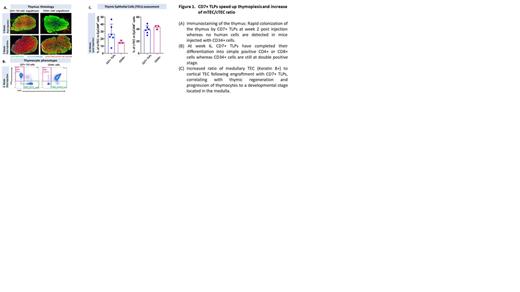Background and Significance
Allogeneic hematopoietic stem cell transplantation (HSCT) is the only curative treatment option for many patients with hematological malignancies, but an HLA-matched donor may not be available, e.g., for ethnic populations under-represented in donor registries. In the absence of an HLA-matched donor, the use of post-transplant cyclophosphamide in unmanipulated haploidentical HSCT (haplo PTCy HSCT) is the favored strategy. However, in vivo T-cell depletion by PTCy significantly impairs immune reconstitution up to 2 years post-transplant, resulting in higher infection-related mortality and relapse rate.
SMART101 is a cell therapy using allogeneic CD7+ T-lymphoid progenitors (TLP) produced in culture from mobilized peripheral blood CD34+ cells from an HSCT donor via Smart Immune's GMP manufacturing process. This ex vivo lymphoid niche culture system uses the Notch ligand Delta-like 4 coupled to IgG2 Fc fragment (DLL4-Fc) and RetroNectin® and a specific combination of cytokines, mimicking the initial steps of bone marrow lymphoid and T-cell differentiation.
Characterization studies of these allogeneic CD7+ TLPs using single cell RNA sequencing analysis, suggested their high lymphoid commitment and thymic homing potentials. Preclinical in vivo experiments in irradiated adult and non-conditioned neonatal NSG mice demonstrate the capacity of these cells to migrate to the thymus, induce the generation of medullary thymic epithelial cells (TEC) and accelerate the generation of a polyclonal human T cell repertoire.
Fig 1 shows the kinetic of cell engraftment and T-cell differentiation for CD34+ cells or CD7+ TLPs.
Aims
The SI101-02 clinical study (EudraCT 2022-002530-14) seeks to provide proof of concept that SMART101 cells can rapidly complete their differentiation within patient's thymus into naïve T-cells, accelerating the production of polyclonal donor T-cells without GvHD-inducing potential, and reduce the non-relapse and disease relapse mortality post haplo PTCy HSCT.
Study Design and Methods
This first-in-human, open-label, dose-escalation, two-cohort, multicenter phase I/II study will evaluate the safety and activity of SMART101 infusion (D6) in adult patients with AML, ALL or high-risk MDS eligible for an haplo PTCy HSCT (D0) as standard of care.
The study is comprised of two segments. The first is a phase I dose escalation with three dose-levels of SMART101 (1.5 x 10 6, 4.5 x 10 6 and 9.0 x 10 6 CD7+ cells/kg of body weight) to define the recommended dose. The second is a phase II segment that will be comprised of 2 cohorts according to the type of conditioning regimen (myeloablative vs. reduced intensity conditioning). Patients will be enrolled in two consecutive stages following a Simon's 2 stage design, with 9 patients in stage 1 and 8 new patients in stage 2. Each cohort will be analyzed separately. The primary endpoints are the occurrence of unexpected unacceptable toxicity within 14 days after the infusion of SMART101 for the dose escalation segment, with a co-primary endpoint evaluating the activity of SMART101 in term of immune reconstitution (naïve CD4+ T cells ≥ 50/μL by D100) for the phase II segment. Secondary endpoints include the overall safety profile, especially the occurrence of GvHD and graft failure, the incidence of non-relapse/relapse mortality, and a detailed evaluation of the immune reconstitution.
The SI101-02 study was initiated in H1-2023 in France and Italy. The study design, major inclusion and exclusion criteria, study treatment specificities, statistical methods and details of the ProTcell platform will be presented.
Conclusion
SMART101 is the first-generation of allogeneic TLP cell therapy obtained from Smart Immune's proprietary GMP manufacturing platform. The duration and the depth of T cell immunodeficiency post haplo PTCy HSCT is expected to be significantly reduced by the infusion of SMART101 thereby decreasing the non-relapse mortality and morbidity rates and thus improving the overall clinical outcome of this therapy.
Disclosures
Devillier:Astellas: Honoraria; Incyte: Honoraria; Jazz Pharmaceuticals: Honoraria; Medac: Honoraria; Sanofi: Honoraria; MSD: Honoraria. Peffault De Latour:Jazz Pharmaceuticals: Honoraria. Chevallier:Mallinckrodt Pharmaceuticals: Honoraria; Sanofi: Honoraria; Incyte: Honoraria, Research Funding; Takeda: Honoraria; Immedica Pharma: Honoraria; Servier: Honoraria. Huynh:Jazz: Other: travel fees, advisory board; Servier: Other: Advisory board; Pfizer: Other: advisory board; Astellas: Other: Advisory board; Medac: Other: Advisory board; Novartis: Other: travel fees, advisory board; Neovii: Other: Advisory board. Ciceri:ExCellThera: Other: Scientific Advisory Board .


